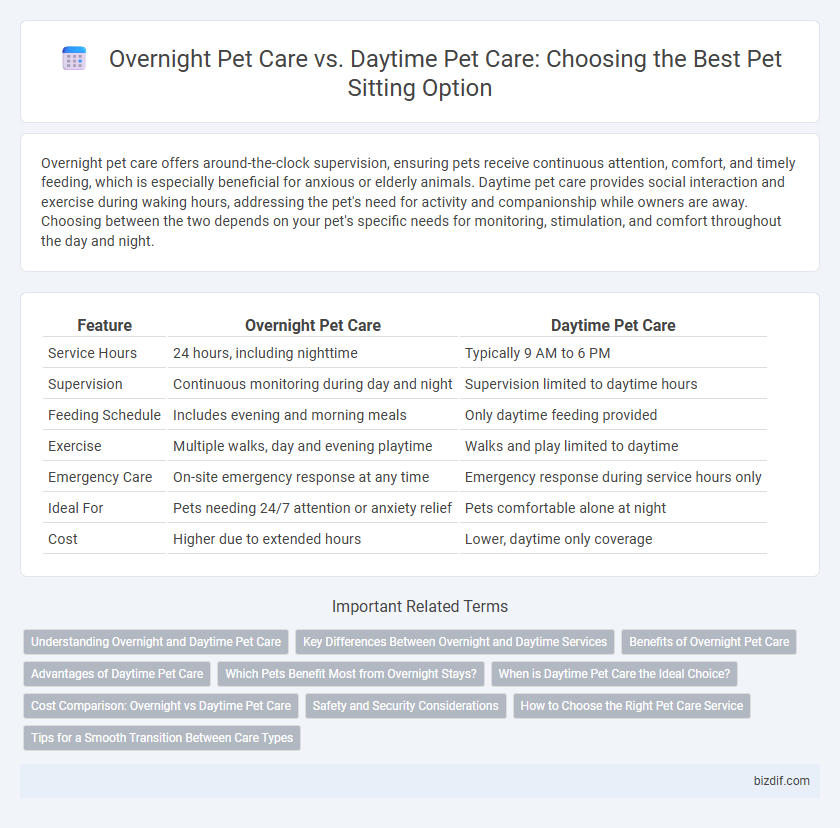Overnight pet care offers around-the-clock supervision, ensuring pets receive continuous attention, comfort, and timely feeding, which is especially beneficial for anxious or elderly animals. Daytime pet care provides social interaction and exercise during waking hours, addressing the pet's need for activity and companionship while owners are away. Choosing between the two depends on your pet's specific needs for monitoring, stimulation, and comfort throughout the day and night.
Table of Comparison
| Feature | Overnight Pet Care | Daytime Pet Care |
|---|---|---|
| Service Hours | 24 hours, including nighttime | Typically 9 AM to 6 PM |
| Supervision | Continuous monitoring during day and night | Supervision limited to daytime hours |
| Feeding Schedule | Includes evening and morning meals | Only daytime feeding provided |
| Exercise | Multiple walks, day and evening playtime | Walks and play limited to daytime |
| Emergency Care | On-site emergency response at any time | Emergency response during service hours only |
| Ideal For | Pets needing 24/7 attention or anxiety relief | Pets comfortable alone at night |
| Cost | Higher due to extended hours | Lower, daytime only coverage |
Understanding Overnight and Daytime Pet Care
Overnight pet care involves providing attentive supervision and companionship to pets throughout the night, ensuring their safety, comfort, and timely feeding or medication. Daytime pet care focuses on regular visits during waking hours to manage exercise, feeding, and playtime, allowing pets to maintain their routine while owners are away. Both services cater to different needs based on pets' schedules and owners' availability, emphasizing the importance of tailored attention for pet well-being.
Key Differences Between Overnight and Daytime Services
Overnight pet care involves caregivers staying at the pet owner's home or a facility for extended periods, ensuring continuous monitoring and companionship during sleeping hours, which is ideal for pets requiring constant attention or anxiety relief. Daytime pet care typically includes scheduled visits lasting a few hours, providing feeding, exercise, and playtime during the day without overnight supervision. The key differences lie in the duration of care, level of supervision, and the pet's specific needs, with overnight services offering round-the-clock presence and daytime services focusing on intermittent, activity-based visits.
Benefits of Overnight Pet Care
Overnight pet care provides extended companionship and continuous monitoring, ensuring pets receive personalized attention, timely feeding, and comfort throughout the night. This service significantly reduces separation anxiety for pets and increases their safety by allowing caregivers to quickly respond to emergencies or unusual behavior. Compared to daytime pet care, overnight care supports pets' emotional well-being and stabilizes routines, crucial for senior animals or those with special medical needs.
Advantages of Daytime Pet Care
Daytime pet care offers pets the benefit of regular social interaction and mental stimulation through playtime and walks, which support their overall well-being. Pet sitters can closely monitor any changes in behavior or health during daylight hours, ensuring timely attention to needs. This type of care also allows pets to stay in their comfortable home environment while owners remain confident their pets receive active engagement.
Which Pets Benefit Most from Overnight Stays?
Overnight pet care is especially beneficial for pets with anxiety, medical needs, or those requiring frequent monitoring, such as elderly dogs or cats with chronic conditions. Unlike daytime pet care, overnight stays provide constant companionship and allow for timely administration of medication and comfort during nighttime hours. Pets recovering from surgery or exhibiting separation anxiety show significant improvement with overnight pet sitters who offer extended attention and security.
When is Daytime Pet Care the Ideal Choice?
Daytime pet care is the ideal choice for pets that require regular social interaction, exercise, and monitoring during waking hours. This option suits owners with daytime commitments who want their pets to maintain routines and engage in activities without overnight separation anxiety. Dogs needing frequent potty breaks and mental stimulation benefit significantly from daytime pet sitting services.
Cost Comparison: Overnight vs Daytime Pet Care
Overnight pet care typically costs 30% to 50% more than daytime pet care due to the extended hours and personalized attention required during nighttime stays. Daytime pet care rates average around $15 to $25 per hour, while overnight services can range from $50 to $100 per night depending on location and pet needs. Choosing overnight care provides continuous supervision, which may justify higher costs for pets with health or behavioral issues.
Safety and Security Considerations
Overnight pet care provides continuous supervision, reducing risks associated with pet anxiety, escape attempts, or medical emergencies during nighttime hours, enhancing overall safety. Daytime pet care offers intermittent monitoring which may delay response to urgent situations, making it crucial to assess the pet sitter's alertness and environment security. Secure homes, proper access controls, and sitter experience play pivotal roles in ensuring the pet's safety and security regardless of care duration.
How to Choose the Right Pet Care Service
Choosing between overnight pet care and daytime pet care depends on your pet's specific needs and daily routine. Overnight pet care offers extended supervision and companionship, ideal for pets with separation anxiety or medical conditions requiring frequent monitoring. Daytime pet care suits active pets needing socialization and exercise while owners are at work, ensuring mental stimulation and physical activity.
Tips for a Smooth Transition Between Care Types
Establish a consistent routine by communicating detailed schedules and pet preferences to both overnight and daytime caregivers to ensure continuity of care. Introduce pets gradually to new caregivers through short visits or supervised interactions, minimizing stress and building familiarity. Provide comprehensive information on feeding, medication, and behavioral cues to prepare caregivers for seamless handoffs between care types.
Overnight pet care vs Daytime pet care Infographic

 bizdif.com
bizdif.com